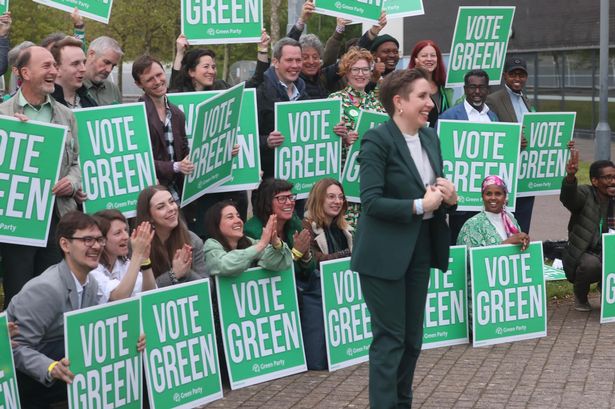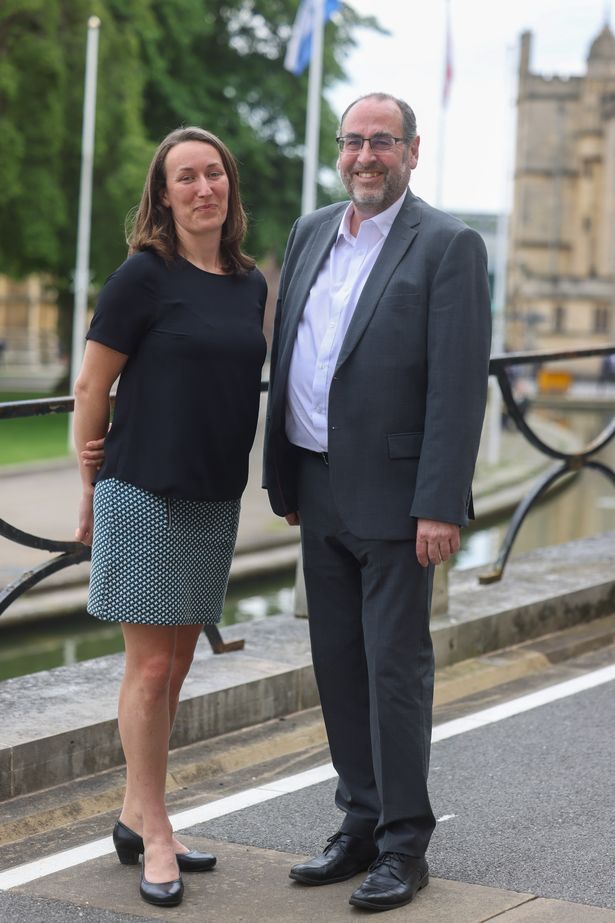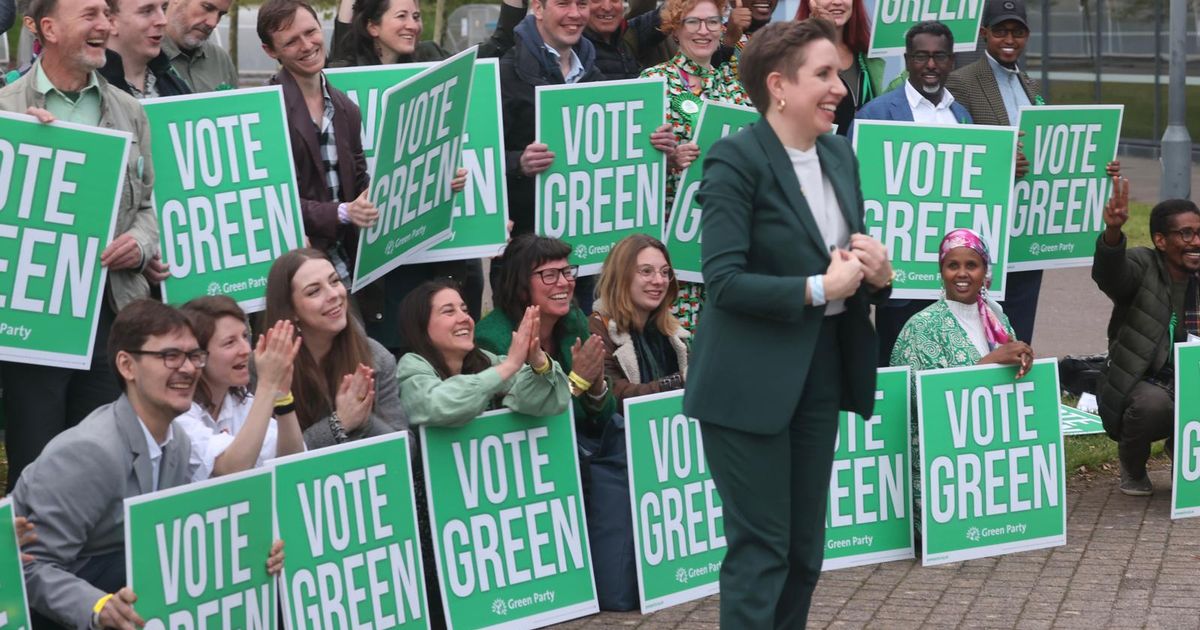Labour has criticised “bonkers proposals” such as collecting bins less often Green Party representatives including Carla Denyer pictured in May 2024 after the party’s local elections victory
Green Party representatives including Carla Denyer pictured in May 2024 after the party’s local elections victory
The Green Party has now been largely in charge of running Bristol City Council for a whole year. The Greens took control in local elections last May, now holding six of the eight powerful roles of policy committee chairs, while the Liberal Democrats hold the other two.
Controversies since then include planned changes to rubbish collection and the roll out of controversial traffic schemes. The Greens say they are “tackling head on many problems” left by the former Labour administration. Labour, now in opposition, say the year has been marked by “bonkers policy proposals and broken promises”.
Green Councillor Tony Dyer is the new leader of the council, having replaced the former Labour mayor Marvin Rees last May. The role of council leader is similar to a mayor, but with fewer powers. He said his biggest achievement so far was “boringly obvious”: setting the annual budget. This budget includes collecting bins less often while also increasing council tax.
Cllr Dyer said: “Despite years of financial under-performance under Bristol Labour and 14 years of Conservative cuts to council finances, we have set a balanced budget, investing millions into council housing, tackling homelessness, adults and community services, and children and education.
“We have also improved the savings delivery targets and the way in which we find and identify risks to the council. But we know that local authorities are still under threat. While councils up and down the country fight to keep afloat, I will continue to lobby this government for greater funding so we can keep delivering for Bristol.”
The most noticeable change since the Greens took over is the controversial cuts to bin collections. The council consulted on collecting general waste in black bins once every three or four weeks, less often than the current two-week schedule.
 Deputy leader Heather Mack and council leader Tony Dyer(Image: PAUL GILLIS / Reach PLC)
Deputy leader Heather Mack and council leader Tony Dyer(Image: PAUL GILLIS / Reach PLC)
This sparked national headlines and the Greens later ruled out support for a four-week schedule, which was unsurprisingly unpopular. A move to a three-week collection could be rolled out in some parts of Bristol by the end of the year, with a gradual change across the city.
The other major change, affecting neighbourhoods in east Bristol, is the installation of a liveable neighbourhood. Bollards, planters and bus gates now restrict traffic in Barton Hill, Redfield and St George, to make residential roads nicer and safer to walk and cycle along. However the project has attracted fierce opposition and sparked claims that traffic is now much worse.
Plans for the East Bristol Liveable Neighbourhood began under the former Labour administration. However Labour, now in opposition, has been critical of how the transport scheme was rolled out. To overcome repeated protests, final parts of the liveable neighbourhood were installed in the middle of the night, with support from police officers.
‘Regrets’
Cllr Dyer recently told the BBC he regrets how the liveable neighbourhood scheme was rolled out. Similar plans are about to be revealed for a second scheme, covering Totterdown, Bedminster and Southville, which are expected to spark just as much controversy.
The Greens have many other ambitious transport plans which will affect how hundreds of thousands of people will travel across Bristol. One of the major bugbears about Bristol is its suboptimal transport network, with heavy congestion and unreliable bus services. A raft of transport projects are now being drawn up to address these problems.
These include preventing cars from driving through Park Street, to stop buses from getting stuck in queuing traffic, and building new bus lanes and cycling paths across many parts of the city. But major changes to infrastructure like this take longer than a year to plan and then roll out.
Elsewhere, the Greens say the atmosphere working for the council has “vastly improved” since last May. This was backed up by a survey in September when one in four staff said the council had become a better place to work. This increased from last year’s 18 per cent of staff. Social workers in particular have seen improvements, according to a recent Ofsted report.
Cllr Paula O’Rourke, vice-chair of the HR committee said, “I am hearing from friends and colleagues that the atmosphere throughout the council workforce has been completely transformed. We are committed to working with officers at every level to not only make sure our vision for the city gets delivered, but to make sure the council remains a positive place to work.”
Labour said this was a “tad disingenuous” given that the survey was carried out between May and June, only a few weeks after the local elections. At the same time the Greens took over, the council switched how it was run.
In a city-wide referendum in 2022, voters chose to scrap the role of a directly elected mayor and bring in a committee system instead. This involves eight committees, each with councillors from all parties, becoming responsible for certain areas of policy, such as transport or housing.
This switch faced initial teething problems, such as a lack of actual decisions being made to begin with or making fewer public meetings available to watch online. But now a year on, the eight policy committees can be watched live on YouTube, providing much more insight into how decisions are made than under the former mayoral system, when debates were less open.
‘Rebuilding trust’
Cllr Heather Mack, deputy leader of the council, said: “The continuation of policies that put the interests of a few over working people and public services means that trust in institutions is at an all time low. As a council, we are prioritising rebuilding this trust with the people of Bristol. More decisions are made in public, more meetings of councillors are streamed online and public engagement has significantly increased.
“Despite the challenges presented by continued austerity, we know we still have work to do. We will continue to be transparent and honest with Bristol while telling you what we’re doing, and why, to make the city better for everyone.”
Ultimately hampering how much whoever leads the council can actually do is an ongoing lack of money. Despite Labour winning the general election last summer, Bristol and many other councils are still struggling to balance the books, with ballooning costs for social care and special needs education, meaning there is less left over to spend on other day-to-day services.
Speaking to the BBC, Cllr Dyer said: “All parties, regardless of what their political colour is, are under the same restrictions. If you haven’t got the money coming in and you’re not getting funding to do the things you want to do, then regardless of what rosette you have to wear, you’re going to have to make tough decisions.”
Labour said the government has given the council an extra £27 million this year, a “significant real-terms increase”. The party chose not to take up any seats as policy chairs, preferring instead to play the role of opposition. So far, many decisions have been criticised by Labour.
Cllr Tom Renhard, leader of the Labour group, said: “The amount of hot air produced by Green Party HQ puts the balloon fiesta to shame. Their first year in power has been defined by bonkers policy proposals, embarrassing u-turns, and a litany of broken promises.
“Only six months after taking power, they put forward plans to close up to 19 libraries, sack every lollipop person, remove funding to support those experiencing domestic violence, and mothball museums. Then they proposed to collect your black bins only once every four weeks, while they hiked your council tax.
“This is clearly not what Bristolians want and, thankfully, residents fought back and forced the Greens to ditch these ideas — for the time being at least. Under their leadership, the council is less transparent, less accountable and less trustworthy.”
He gave examples of the council scrapping housing plans and selling off the Bottle Yard film studios in Hengrove. Housing has been a particular struggle for the Greens, who have switched the focus from building new council homes towards making current ones safer to live in.
Cllr Renhard added: “On transparency, they made a backroom deal with the Tories to scrap £92 million worth of council housing and refused to even let councillors vote on their deal. On accountability, when presenting the budget cuts they signed off, they disowned them and claimed they had nothing to do with them, pinning the blame on council staff.
“On trust, they installed traffic calming measures in a working-class community in the middle of the night, backed up by private security and police equipped with drones. They’re carrying out a fire sale of public assets and are privatising our award-winning, publicly-owned film studios.
“They cut the council housebuilding pipeline by a mammoth 76 per cent and are planning to auction off existing council homes to the private sector. Clearly, their claims of success deserve short shrift.”
